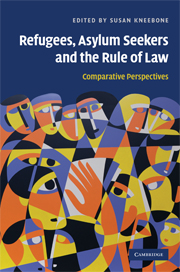Book contents
- Frontmatter
- Contents
- Contributors
- Foreword
- Preface
- Introduction: Refugees and Asylum Seekers in the International Context – Rights and Realities
- 1 The Rule of Law and the Role of Law: Refugees and Asylum Seekers
- 2 Asylum and the Rule of Law in Canada: Hearing the Other (Side)
- 3 Refugees, Asylum and the Rule of Law in the USA
- 4 The Australian Story: Asylum Seekers outside the Law
- 5 The Intersection between the International, the Regional and the Domestic: Seeking Asylum in the UK
- 6 Conclusions on the Rule of Law
- Appendix
- Bibliography
- Index
6 - Conclusions on the Rule of Law
Published online by Cambridge University Press: 10 December 2009
- Frontmatter
- Contents
- Contributors
- Foreword
- Preface
- Introduction: Refugees and Asylum Seekers in the International Context – Rights and Realities
- 1 The Rule of Law and the Role of Law: Refugees and Asylum Seekers
- 2 Asylum and the Rule of Law in Canada: Hearing the Other (Side)
- 3 Refugees, Asylum and the Rule of Law in the USA
- 4 The Australian Story: Asylum Seekers outside the Law
- 5 The Intersection between the International, the Regional and the Domestic: Seeking Asylum in the UK
- 6 Conclusions on the Rule of Law
- Appendix
- Bibliography
- Index
Summary
This book explores national legal responses to issues raised by refugees and asylum seekers and the rule of law. The issue of the rights and status of the asylum seeker in the legal system raises fundamental questions about how to maintain the ‘integrity’ of the rule of law when it is under challenge, and the role of the state to protect individuals who are not its ‘nationals’. The basic argument in this book is that the way that the rule of law operates at the national level in relation to refugees and asylum seekers in the jurisdictions examined is denying them access to their rights under international law. In particular, the twin precepts of refugee protection – the right to seek asylum and the right against non-refoulement – are under threat.
A comparison of the five jurisdictions – namely Canada, the USA, Australia, New Zealand and the UK – tells some interesting stories. Although they share a common law heritage, majority language and colonial past, and a tendency to borrow ideas for responses from each other, there are differences in each jurisdiction in the way that the Refugee Convention is received, which influence the precise way in which each legal system responds to issues about asylum seekers and refugees. Yet, despite those differences, there are broadly similar patterns in the response of these receiving countries to asylum seekers and refugees over the last decade.
One common response is to exclude asylum seekers and refugees from access to the legal system.
- Type
- Chapter
- Information
- Refugees, Asylum Seekers and the Rule of LawComparative Perspectives, pp. 281 - 309Publisher: Cambridge University PressPrint publication year: 2009

